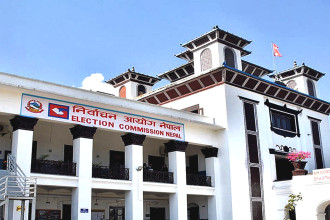
KATHMANDU: Various private sector organisations have given mixed reactions to the budget for the fiscal year 2022/23 presented by Finance Minister Janardan Sharma on May 29. Although banks and financial institutions (BFIs) seem enthusiastic about the inclusion of a green economy, some have expressed concern over the implementation of the schemes.
Ambitious Plan: Questionable Implementation, Abhinav Churiwal, Managing Director, Mangalam Industries [gallery columns="1" link="file" size="full" ids="24563"] This budget is a Big Bang budget with a lot of promise. But we have seen multiple budgets like the last year's which promise a lot but deliver meagerly. The government's ability to carry out large projects on a national scale with planning, speed, and cost control is going to be imperative. The government's revenue target, as well as the other source of fund, is highly ambitious and businesses will be sceptical about Nepal's ability to pull it off owing to previous our experience. However, there are great provisions for industry promotion and protection which should encourage more people to set up industries and for existing ones to expand.
Increasing investment in agriculture and energy is positive: Sunil KC, CEO, NMB Bank [gallery columns="1" link="file" size="full" ids="24564"] The upcoming budget appears to address the current trade (balance) deficit and balance of payments issues. The budget has a policy of encouraging exports and reducing imports. Increasing investment in agriculture and energy is also included in the discussion. The budget also addresses the topic of the green economy which is good news for the financial sector. It will aid in the stabilization of the banking industry in the future.
Employment to 200,000 Youth: Need for Cooperation with Private Sector: Sandesh Bhandari, Managing Director, Kumari Job [gallery columns="1" link="file" size="full" ids="24565"] The 15% increase in the salaries of government employees is beneficial for high pay employees, but it does not seem to make much difference to low-income employees. And it seems that inflation will continue to rise and the impact of inflation will be even greater on low-income people. That means with the rising of prices, people's purchasing power is declining. Similarly, revisions in the income tax slab have made it possible to bring more people under the tax net. Another point is that providing employment to 200,000 young people every year is fantastic, but so is the challenge. Because providing employment is a challenging task. It appears that the government should collaborate with private sector organizations such as ours, i.e. human resource management firms. Similarly, things like developing a production-based economy, job creation, and high economic growth sound good, but there is not much clarity in favour of implementation. Therefore, it is necessary to present a comprehensive plan and blueprint of how such things can be assimilated. READ ALSO:
Ambitious Plan: Questionable Implementation, Abhinav Churiwal, Managing Director, Mangalam Industries [gallery columns="1" link="file" size="full" ids="24563"] This budget is a Big Bang budget with a lot of promise. But we have seen multiple budgets like the last year's which promise a lot but deliver meagerly. The government's ability to carry out large projects on a national scale with planning, speed, and cost control is going to be imperative. The government's revenue target, as well as the other source of fund, is highly ambitious and businesses will be sceptical about Nepal's ability to pull it off owing to previous our experience. However, there are great provisions for industry promotion and protection which should encourage more people to set up industries and for existing ones to expand.
Increasing investment in agriculture and energy is positive: Sunil KC, CEO, NMB Bank [gallery columns="1" link="file" size="full" ids="24564"] The upcoming budget appears to address the current trade (balance) deficit and balance of payments issues. The budget has a policy of encouraging exports and reducing imports. Increasing investment in agriculture and energy is also included in the discussion. The budget also addresses the topic of the green economy which is good news for the financial sector. It will aid in the stabilization of the banking industry in the future.
Employment to 200,000 Youth: Need for Cooperation with Private Sector: Sandesh Bhandari, Managing Director, Kumari Job [gallery columns="1" link="file" size="full" ids="24565"] The 15% increase in the salaries of government employees is beneficial for high pay employees, but it does not seem to make much difference to low-income employees. And it seems that inflation will continue to rise and the impact of inflation will be even greater on low-income people. That means with the rising of prices, people's purchasing power is declining. Similarly, revisions in the income tax slab have made it possible to bring more people under the tax net. Another point is that providing employment to 200,000 young people every year is fantastic, but so is the challenge. Because providing employment is a challenging task. It appears that the government should collaborate with private sector organizations such as ours, i.e. human resource management firms. Similarly, things like developing a production-based economy, job creation, and high economic growth sound good, but there is not much clarity in favour of implementation. Therefore, it is necessary to present a comprehensive plan and blueprint of how such things can be assimilated. READ ALSO:
Published Date: June 6, 2022, 12:00 am
Post Comment
E-Magazine
RELATED B360 National





